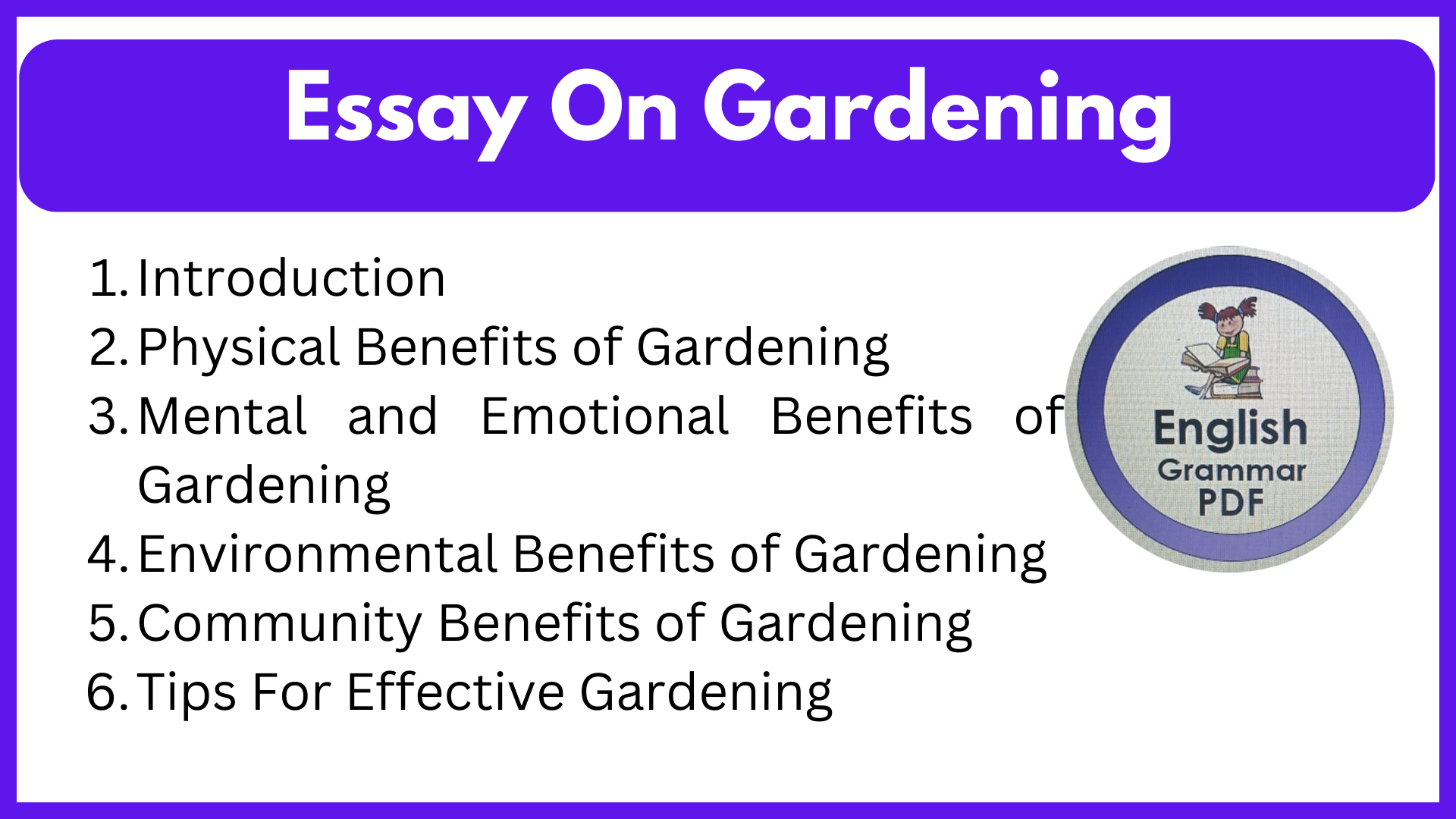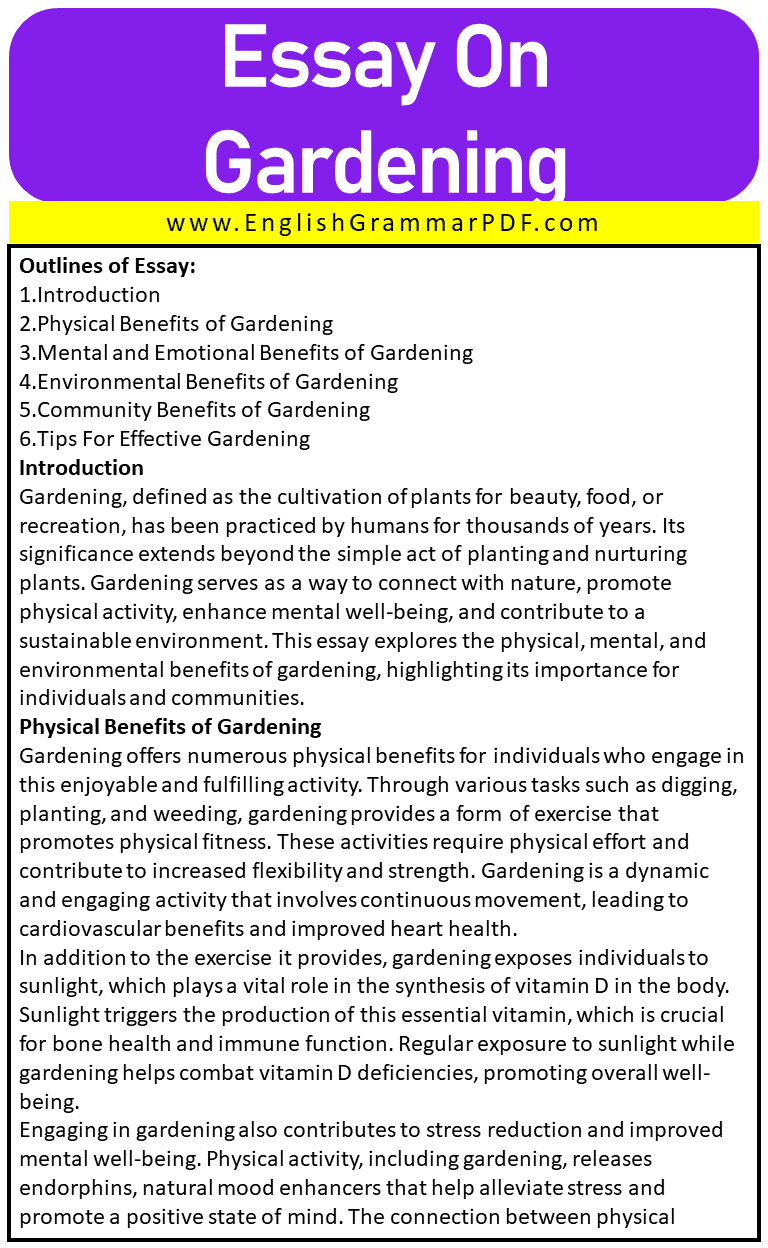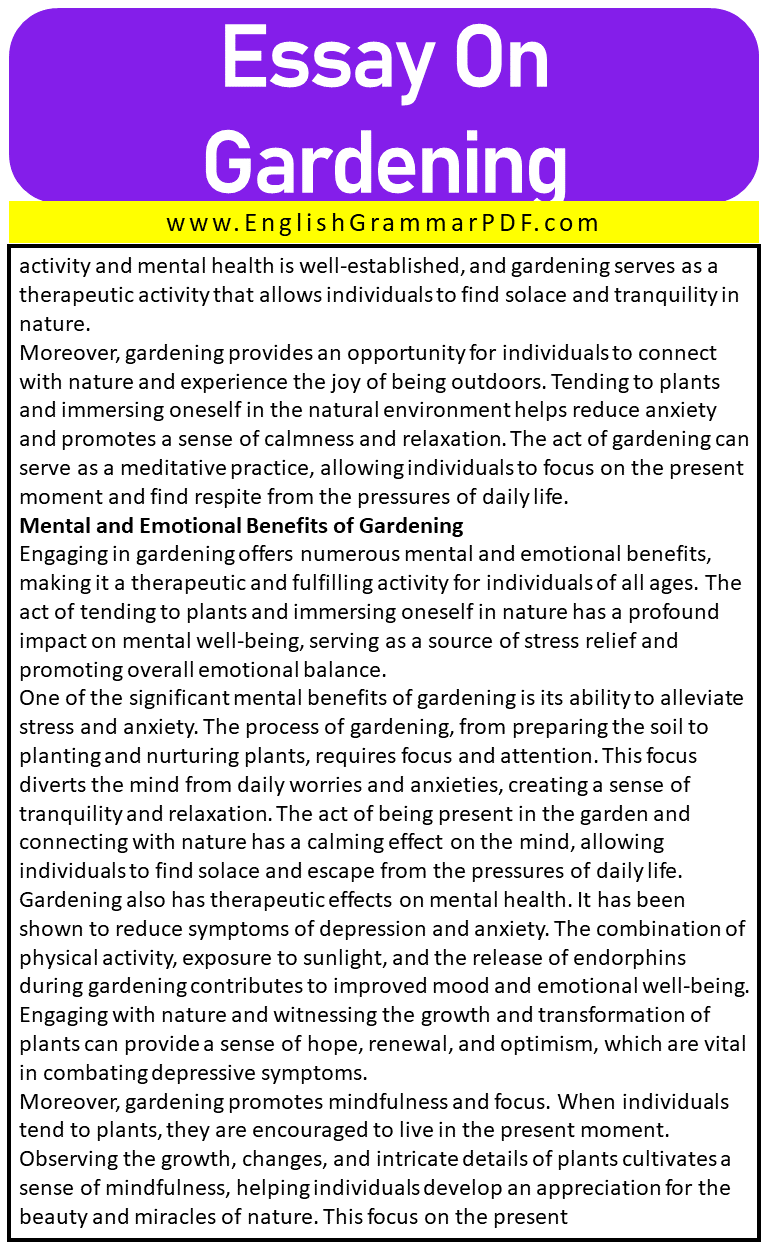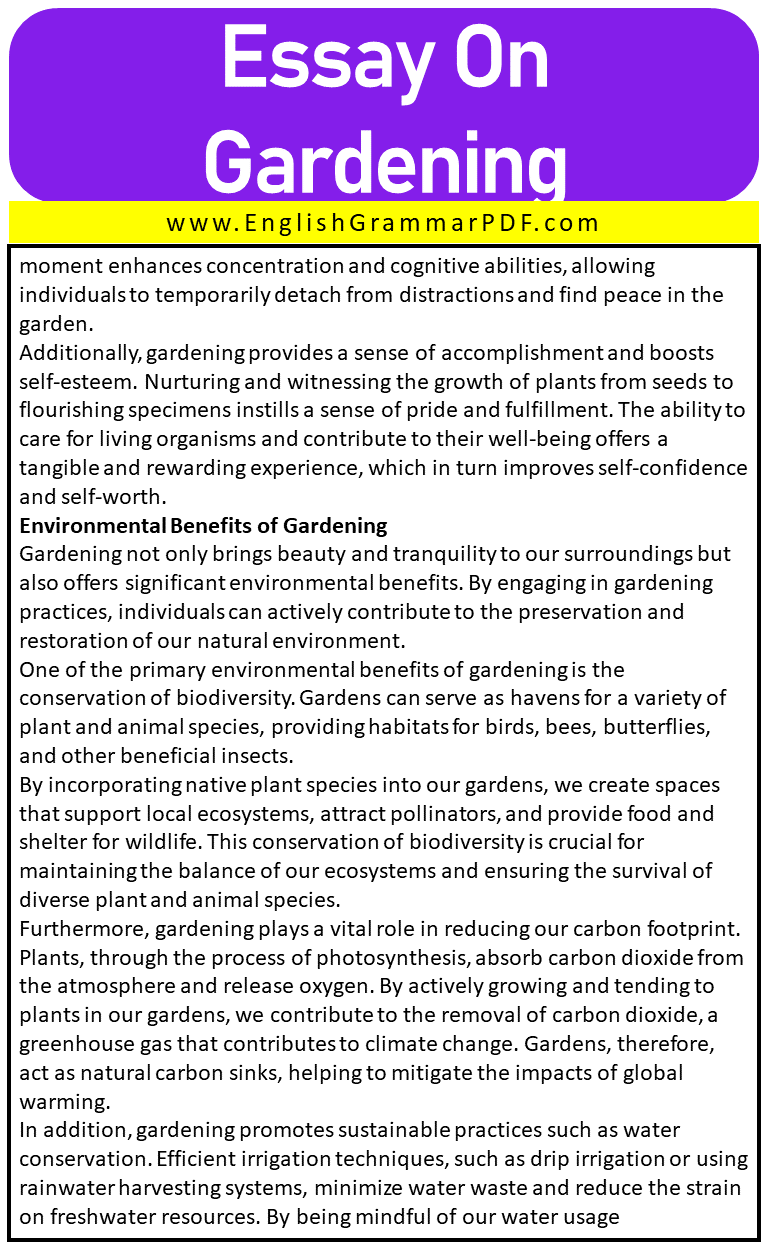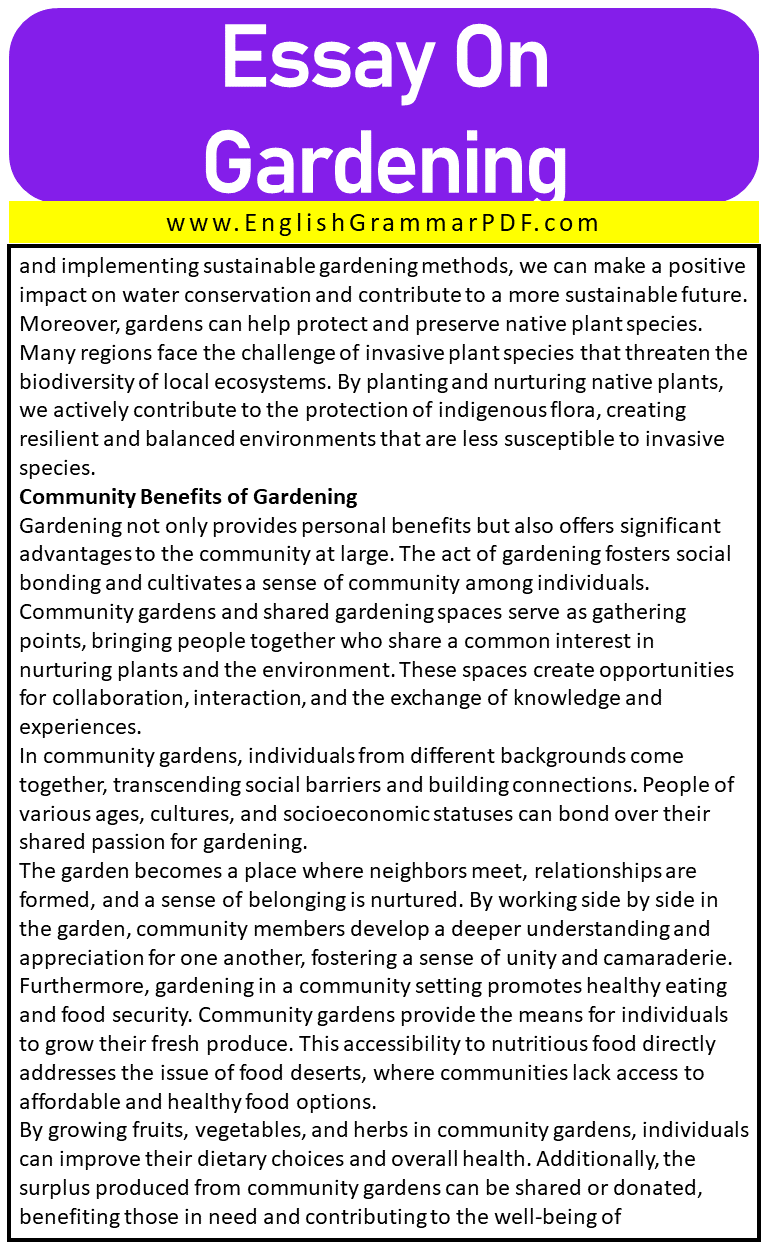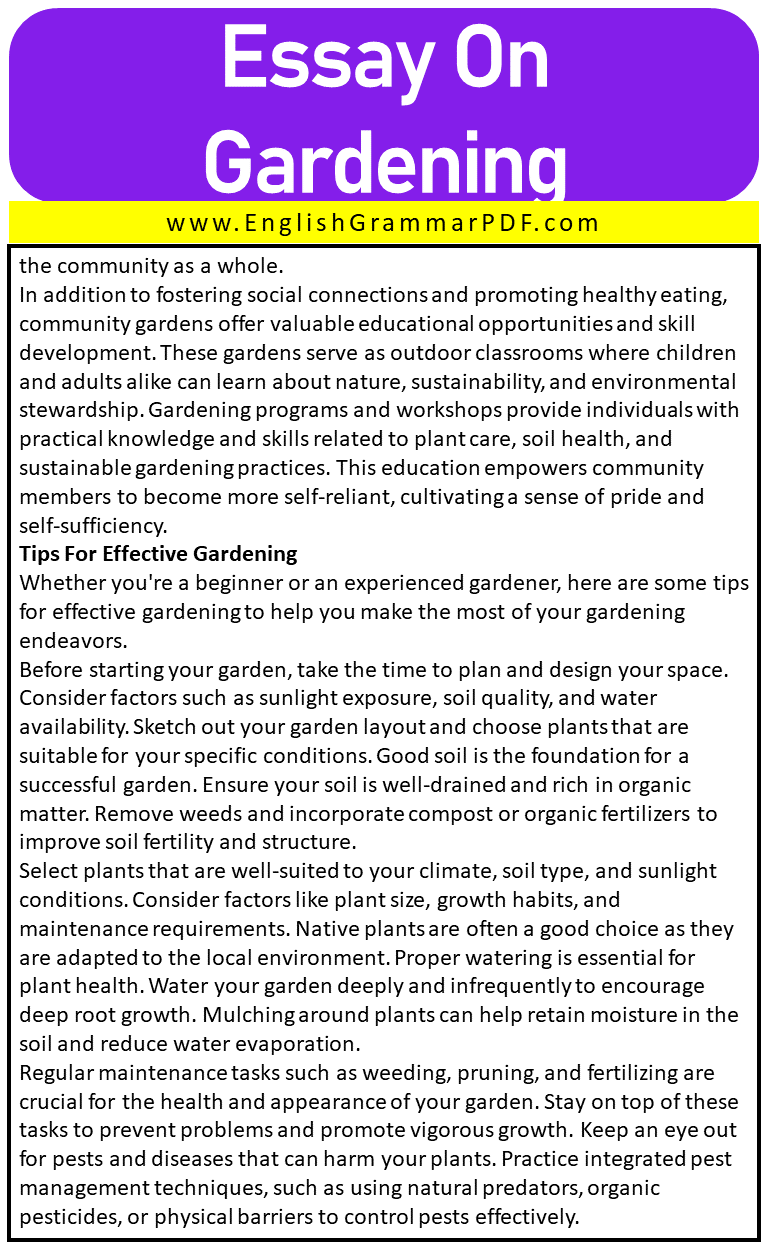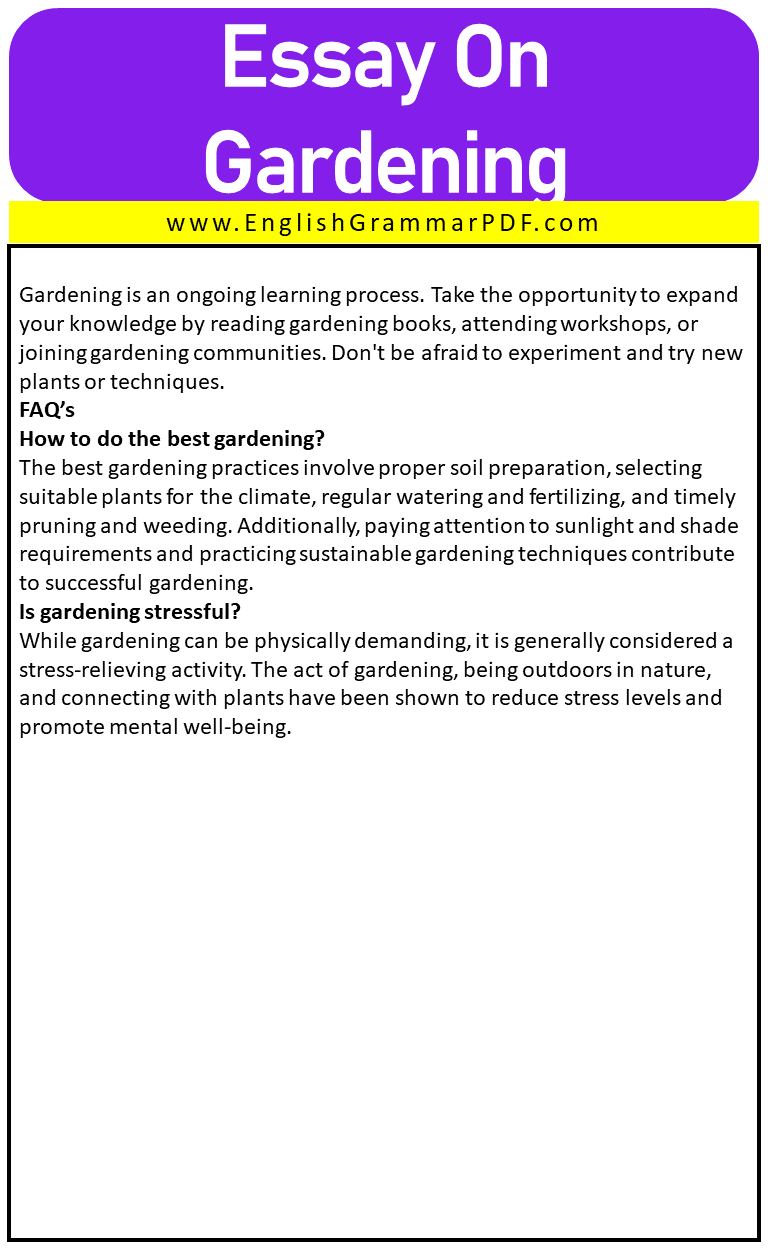Essay On Gardening
Outlines of Essay:
- Introduction
- Physical Benefits of Gardening
- Mental and Emotional Benefits of Gardening
- Environmental Benefits of Gardening
- Community Benefits of Gardening
- Tips For Effective Gardening
Introduction
Gardening, defined as the cultivation of plants for beauty, food, or recreation, has been practiced by humans for thousands of years. Its significance extends beyond the simple act of planting and nurturing plants. Gardening serves as a way to connect with nature, promote physical activity, enhance mental well-being, and contribute to a sustainable environment. This essay explores the physical, mental, and environmental benefits of gardening, highlighting its importance for individuals and communities.
Physical Benefits of Gardening
Gardening offers numerous physical benefits for individuals who engage in this enjoyable and fulfilling activity. Through various tasks such as digging, planting, and weeding, gardening provides a form of exercise that promotes physical fitness. These activities require physical effort and contribute to increased flexibility and strength. Gardening is a dynamic and engaging activity that involves continuous movement, leading to cardiovascular benefits and improved heart health.
In addition to the exercise it provides, gardening exposes individuals to sunlight, which plays a vital role in the synthesis of vitamin D in the body. Sunlight triggers the production of this essential vitamin, which is crucial for bone health and immune function. Regular exposure to sunlight while gardening helps combat vitamin D deficiencies, promoting overall well-being.
Engaging in gardening also contributes to stress reduction and improved mental well-being. Physical activity, including gardening, releases endorphins, natural mood enhancers that help alleviate stress and promote a positive state of mind. The connection between physical activity and mental health is well-established, and gardening serves as a therapeutic activity that allows individuals to find solace and tranquility in nature.
Moreover, gardening provides an opportunity for individuals to connect with nature and experience the joy of being outdoors. Tending to plants and immersing oneself in the natural environment helps reduce anxiety and promotes a sense of calmness and relaxation. The act of gardening can serve as a meditative practice, allowing individuals to focus on the present moment and find respite from the pressures of daily life.
Mental and Emotional Benefits of Gardening
Engaging in gardening offers numerous mental and emotional benefits, making it a therapeutic and fulfilling activity for individuals of all ages. The act of tending to plants and immersing oneself in nature has a profound impact on mental well-being, serving as a source of stress relief and promoting overall emotional balance.
One of the significant mental benefits of gardening is its ability to alleviate stress and anxiety. The process of gardening, from preparing the soil to planting and nurturing plants, requires focus and attention. This focus diverts the mind from daily worries and anxieties, creating a sense of tranquility and relaxation. The act of being present in the garden and connecting with nature has a calming effect on the mind, allowing individuals to find solace and escape from the pressures of daily life.
Gardening also has therapeutic effects on mental health. It has been shown to reduce symptoms of depression and anxiety. The combination of physical activity, exposure to sunlight, and the release of endorphins during gardening contributes to improved mood and emotional well-being. Engaging with nature and witnessing the growth and transformation of plants can provide a sense of hope, renewal, and optimism, which are vital in combating depressive symptoms.
Moreover, gardening promotes mindfulness and focus. When individuals tend to plants, they are encouraged to live in the present moment. Observing the growth, changes, and intricate details of plants cultivates a sense of mindfulness, helping individuals develop an appreciation for the beauty and miracles of nature. This focus on the present moment enhances concentration and cognitive abilities, allowing individuals to temporarily detach from distractions and find peace in the garden.
Additionally, gardening provides a sense of accomplishment and boosts self-esteem. Nurturing and witnessing the growth of plants from seeds to flourishing specimens instills a sense of pride and fulfillment. The ability to care for living organisms and contribute to their well-being offers a tangible and rewarding experience, which in turn improves self-confidence and self-worth.
Environmental Benefits of Gardening
Gardening not only brings beauty and tranquility to our surroundings but also offers significant environmental benefits. By engaging in gardening practices, individuals can actively contribute to the preservation and restoration of our natural environment.
One of the primary environmental benefits of gardening is the conservation of biodiversity. Gardens can serve as havens for a variety of plant and animal species, providing habitats for birds, bees, butterflies, and other beneficial insects.
By incorporating native plant species into our gardens, we create spaces that support local ecosystems, attract pollinators, and provide food and shelter for wildlife. This conservation of biodiversity is crucial for maintaining the balance of our ecosystems and ensuring the survival of diverse plant and animal species.
Furthermore, gardening plays a vital role in reducing our carbon footprint. Plants, through the process of photosynthesis, absorb carbon dioxide from the atmosphere and release oxygen. By actively growing and tending to plants in our gardens, we contribute to the removal of carbon dioxide, a greenhouse gas that contributes to climate change. Gardens, therefore, act as natural carbon sinks, helping to mitigate the impacts of global warming.
In addition, gardening promotes sustainable practices such as water conservation. Efficient irrigation techniques, such as drip irrigation or using rainwater harvesting systems, minimize water waste and reduce the strain on freshwater resources. By being mindful of our water usage and implementing sustainable gardening methods, we can make a positive impact on water conservation and contribute to a more sustainable future.
Moreover, gardens can help protect and preserve native plant species. Many regions face the challenge of invasive plant species that threaten the biodiversity of local ecosystems. By planting and nurturing native plants, we actively contribute to the protection of indigenous flora, creating resilient and balanced environments that are less susceptible to invasive species.
Community Benefits of Gardening
Gardening not only provides personal benefits but also offers significant advantages to the community at large. The act of gardening fosters social bonding and cultivates a sense of community among individuals. Community gardens and shared gardening spaces serve as gathering points, bringing people together who share a common interest in nurturing plants and the environment. These spaces create opportunities for collaboration, interaction, and the exchange of knowledge and experiences.
In community gardens, individuals from different backgrounds come together, transcending social barriers and building connections. People of various ages, cultures, and socioeconomic statuses can bond over their shared passion for gardening.
The garden becomes a place where neighbors meet, relationships are formed, and a sense of belonging is nurtured. By working side by side in the garden, community members develop a deeper understanding and appreciation for one another, fostering a sense of unity and camaraderie.
Furthermore, gardening in a community setting promotes healthy eating and food security. Community gardens provide the means for individuals to grow their fresh produce. This accessibility to nutritious food directly addresses the issue of food deserts, where communities lack access to affordable and healthy food options.
By growing fruits, vegetables, and herbs in community gardens, individuals can improve their dietary choices and overall health. Additionally, the surplus produced from community gardens can be shared or donated, benefiting those in need and contributing to the well-being of the community as a whole.
In addition to fostering social connections and promoting healthy eating, community gardens offer valuable educational opportunities and skill development. These gardens serve as outdoor classrooms where children and adults alike can learn about nature, sustainability, and environmental stewardship. Gardening programs and workshops provide individuals with practical knowledge and skills related to plant care, soil health, and sustainable gardening practices. This education empowers community members to become more self-reliant, cultivating a sense of pride and self-sufficiency.
Tips For Effective Gardening
Whether you’re a beginner or an experienced gardener, here are some tips for effective gardening to help you make the most of your gardening endeavors.
Before starting your garden, take the time to plan and design your space. Consider factors such as sunlight exposure, soil quality, and water availability. Sketch out your garden layout and choose plants that are suitable for your specific conditions. Good soil is the foundation for a successful garden. Ensure your soil is well-drained and rich in organic matter. Remove weeds and incorporate compost or organic fertilizers to improve soil fertility and structure.
Select plants that are well-suited to your climate, soil type, and sunlight conditions. Consider factors like plant size, growth habits, and maintenance requirements. Native plants are often a good choice as they are adapted to the local environment. Proper watering is essential for plant health. Water your garden deeply and infrequently to encourage deep root growth. Mulching around plants can help retain moisture in the soil and reduce water evaporation.
Regular maintenance tasks such as weeding, pruning, and fertilizing are crucial for the health and appearance of your garden. Stay on top of these tasks to prevent problems and promote vigorous growth. Keep an eye out for pests and diseases that can harm your plants. Practice integrated pest management techniques, such as using natural predators, organic pesticides, or physical barriers to control pests effectively.
Gardening is an ongoing learning process. Take the opportunity to expand your knowledge by reading gardening books, attending workshops, or joining gardening communities. Don’t be afraid to experiment and try new plants or techniques.
FAQ’s
How to do the best gardening?
The best gardening practices involve proper soil preparation, selecting suitable plants for the climate, regular watering and fertilizing, and timely pruning and weeding. Additionally, paying attention to sunlight and shade requirements and practicing sustainable gardening techniques contribute to successful gardening.
Is gardening stressful?
While gardening can be physically demanding, it is generally considered a stress-relieving activity. The act of gardening, being outdoors in nature, and connecting with plants have been shown to reduce stress levels and promote mental well-being.
Explore More Essays:
Download the PDF of the Essay:
